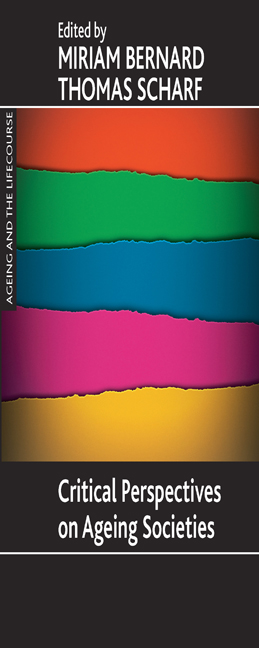one - Critical perspectives on ageing societies
Published online by Cambridge University Press: 14 January 2022
Summary
Behold your future.… You will not apply for membership, but the tribe of the elderly will claim you. Your present will not keep pace with the world’s. This slippage will stretch your skin, sag your skeleton, erode your hair and memory, make your skin turn opaque so your twitching organs and blue-cheese veins will be semi-visible. You will venture out only in daylight, avoiding weekends and school holidays. Language, too, will leave you behind, betraying your tribal affiliations whenever you speak. On escalators, on trunk roads, in supermarket aisles, the living will overtake you, incessantly. Elegant women will not see you. Store detectives will not see you. Salespeople will not see you, unless they sell stair-lifts or fraudulent insurance policies. Only babies, cats and drug addicts will acknowledge your existence. So do not fritter away your days. Sooner than you fear, you will stand before a mirror in a care home, look at your body, and think, ET, locked in a ruddy cupboard for a fortnight. (David Mitchell, 2004, pp 182-3)
Introduction
Fictional though the above account is, it contains within it some of the deepseated attitudes and ambivalences many of us have towards ageing and old age despite the fact that recent decades have witnessed the growth of an ever-widening interest in the ageing of societies. In the context of this book, it is the linking of this interest with an explicit critical gerontological focus that provides a unique set of understandings about ageing and later life in the 21st century. Our contributors draw on original and current research and thinking, offering new insights into the past, present and future and complementing more recent texts edited by colleagues on both sides of the Atlantic (see for example, Estes and Associates, 2001; Arber et al, 2003; Estes et al, 2003; Sheets et al, 2005; Phillipson et al, 2006). Close and scholarly analysis of policies affecting the lives of older people, together with an exploration of why research is done in particular ways, offer challenges to us all as gerontologists and as ageing individuals. Locating these discussions in a series on ‘ageing and the life course’ is also important for it sends a message that ageing is indeed a life course issue and not just something that concerns those whom the rest of society might disparagingly regard as belonging to ‘the tribe of the elderly’.
- Type
- Chapter
- Information
- Critical Perspectives on Ageing Societies , pp. 3 - 12Publisher: Bristol University PressPrint publication year: 2007



